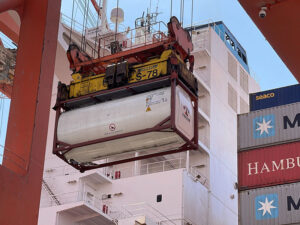The pioneering project optimises an existing freshwater generation system onboard container vessels
Fresh water scarcity is an increasing problem faced by regions all over the world. Four billion people — almost two-thirds of the world’s population — experience severe water scarcity for at least one month each year, and half of the world’s population could be living in areas facing water scarcity by as early as 2025, according to an official press release.
With this background, a team of three employees of AP Moller–Maersk (Maersk), who are former seafarers, decided to undertake an innovative project that could store and deliver fresh water from vessels to ports.
Cargo ships undertaking global trade are equipped with freshwater generator systems that produce clean drinking water by distilling sea water using heat energy harnessed from their engines.
Traditionally, this system has been used to generate water for consumption only onboard the vessels. However, the excess water produced has been overlooked. Through this innovative project, this untapped resource has been capitalised on by optimising the process and storing the excess water in tank containers before delivering it to ports.
Each vessel can fill two tank containers on an average sea voyage between two ports. With the process optimised and tank containers stored at the right location onboard, two tank containers with a combined capacity of 50,000 litres can be filled with fresh water.

Pilot deliveries
Amongst the first pilot runs were the deliveries at the Port of Colombo and Port of Salalah of two tank containers, each filled with 25,000 litres of fresh water.
“At the Port of Salalah, sustainability is one of our top priorities and are committed to decarbonising our operations by 2040. The first tank container of fresh water delivered by Maersk from its vessel is an important milestone that has the potential to pave the path for a larger scheme of things,” affirmed Keld M Christensen, Chief Executive Officer, Port of Salalah.
“This project opens doors for many more ships moving around the world, which can replicate this system and create an incredibly large supply of fresh water that is being delivered all around the world to address the ever-increasing challenge of water scarcity,” he continued.
The fresh water generated and delivered through this innovative project can be used in various ways. These include:
- Consumption at port facilities for basic sanitation, cleaning, and maintenance of offices, warehouses, and restrooms.
- Ship repair at yards for tasks like cleaning vessels, tools, and work areas.
- Container washing before storage or reusing.
- Firefighting at port facilities for emergencies.
- Power generation at power plants located in ports for cooling systems or other processes.
“The successful conclusion of the pilot deliveries is a testament to the innovative capabilities and perseverance of our team,” concluded Leonardo Sonzio, Head of Fleet Management and Technology, Maersk.
